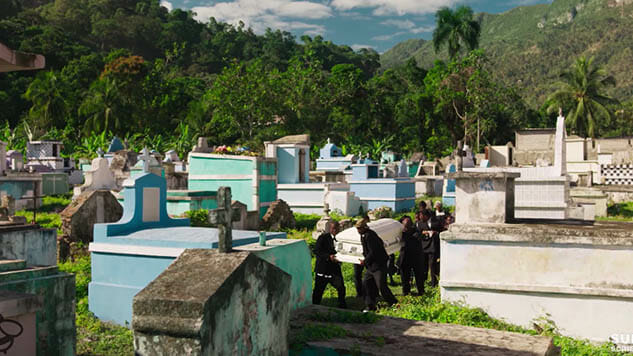What does and doesn’t constitute cultural appropriation? Tracking down your classmate’s mambo aunt and begging her, in between offering her wads of money, to cast a voodoo spell on your pretty boy ex? French filmmaker Bertrand Bonello’s latest picture, Zombi Child, is half historical account, half racial reckoning—entirely ambitious, and equally as ambiguous.
Bonello is white, just like Fanny (Louise Labeque), his bratty, lovesick protagonist, a student at the Légion d’honneur boarding school, which Napoleon established for the purposes of educating the daughters of men awarded the, well, the Légion d’honneur, and where entry remains a hereditary right. To her, voodoo is a means to an end, that end being that Pablo (Sayyid El Alami), her beau, has his soul bound to hers. To Katy (Katiana Milfort), a Haitian voodoo priestess, and to Mélissa (Wislanda Louimat), Katy’s niece and Fanny’s literary sorority sister, it’s a spiritual discipline, an aesthetic and a way of life, rich with beauty but carefully marked by caution signs to keep practitioners from making decisions they’ll regret.
Zombi Child treats voodoo as a character in its own right, a living organism to be revered and not screwed around with. Naturally, Fanny’s first instinct upon hearing of Mélissa’s ancestry and her connection to voodoo is to try and screw around with it, as if voodoo is a class of magic in D&D rather than a set of syncretic religions practiced in the Dominican Republic, Haiti, Louisiana and Brazil. Mélissa tries educating Fanny and her friends on what voodoo means to her as the granddaughter of Clairvius Narcisse, on whose life Zombi Child is based: In 1962, Narcisse (played here by Mackenson Bijou), died, was buried, then returned to life as a zombie, meaning he was actually mickeyed with a melange that made him seem dead, buried alive, then dug up by plantation owners who forced him to harvest sugar cane as their stupefied thrall.
That’s a hell of a heritage, enough to give Mélissa occasional vivid nightmares and make her feel ever as the outsider. Bonello allows Zombi Child to gradually swell as he cuts back and forth from Narcisse’s ordeal to Fanny’s “ordeal”: The film opens up like a grim umbrella of dread over time, Bonello’s deliberate pacing affording Narcisse, Fanny, Mélissa and eventually Katy time to breathe in each scene. They all have their baggage, some more than others, illustrated in Fanny’s efforts to convince Katy that her suffering can only be assuaged with voodoo. Leave it to the rich white girl to compare her pain to the pain of every soul lost in the 2010 Haiti earthquake.
Bonello doesn’t abandon Fanny to his audience’s contempt. She’s selfishly motivated, but everyone is young once and understands the pain of a first breakup. All the same, Zombi Child highlights the ways whiteness tends to stripmine other cultures for personal gain, ignoring historical bases for cultural mores and traditions and instead only seeing commodities for advantaging itself. What makes the movie such a welcome surprise is Bonello’s creativity: Digging back nearly 60 years to trace an arc of trauma inherited through French colonialism takes as much chutzpah as imagination, the latter seen here mostly in the form of atmospheric horror homage.
Zombi Child isn’t a horror movie. It does, however, take notes from horror grammar, notably in the synth-heavy score (composed by Bonello), and its finale, which whether by design or not recalls the chaotic rhythm of the exorcism sequence in Na Hong-jin’s The Wailing, a crosscut of overlapping rituals each linking France and Haiti in the present with Haiti in 1962. The audacity of Bonello’s filmmaking is enough to inspire madness, but the heart that drives Zombi Child forward beats in the pursuit of cultural justice. The film wrestles with identity, and with whiteness especially, and with France’s reputation as an icon of revolution alongside its unflattering reputation as a colonial power guilty of inhuman atrocities. The conclusions Bonello draws are inevitably vague, but the most important message is obvious: That’s cultural appropriation.
Director: Bertrand Bonello
Writer: Bertrand Bonello
Starring: Louise Labeque, Wislanda Louimat, Mackenson Bijou, Katiana Milfort
Release Date: January 24, 2020
Bostonian culture journalist Andy Crump covers the movies, beer, music, and being a dad for way too many outlets, perhaps even yours. He has contributed to Paste since 2013. You can follow him on Twitter and find his collected work at his personal blog. He’s composed of roughly 65% craft beer.
